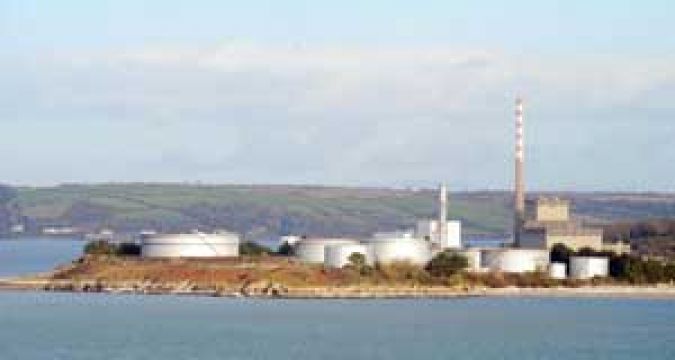A worker at the Whitegate oil refinery in Cork who was unfairly dismissed over the manner in which he was fired after testing positive for alcohol at work is to receive no compensation.
The Workplace Relations Commission (WRC) ruled that no award should be made against Irving Oil Whitegate Refinery as the employee, Eddie Desmond, had “contributed 100 per cent” to his own dismissal.
However, the WRC did order the company to pay Mr Desmond a sum of €14,316 – the equivalent of eight weeks’ pay – after it ruled the refinery had failed to provide him with the statutory minimum notice.
The company maintained that it had operated fair procedures throughout the process which led to Mr Desmond’s dismissal for gross misconduct.
It claimed he had breached the terms of its substance misuse policy by failing to report for testing within a required time limit on December 5th, 2022, and then failing two breathalyser tests for alcohol.
Mr Desmond, who had worked as an operator at the refinery since 1990, claimed the test result was a “false positive” because he had been working with ethanol while fixing a pipe in the refinery.
He also argued that the procedures adopted by Irving Oil in conducting the dismissal were fundamentally flawed.
The company’s doctor, Diarmuid Mulcahy, who examined Mr Desmond after he had failed the breathalyser test, formed the clinical judgement that he was under the influence of alcohol.
Mr Desmond was sent home after being deemed unfit for work and was subsequently suspended on full pay.
He was summarily dismissed on May 12th, 2023, after the allegations against him were upheld following a disciplinary process.
Mr Desmond unsuccessfully appealed the decision to terminate his employment.
Safety risk
Dr Mulcahy gave evidence that the complainant’s test results meant there was a risk of suboptimal work performance, which could pose a safety risk to both Mr Desmond and his work colleagues.
The doctor accepted that he had not performed a urine test on the day as required under the company’s substance misuse policy.
The refinery’s operations manager, Brian Reihill, gave evidence that the two breathalyser tests had shown concentrations of 26 and 22 microgrammes of alcohol per 100ml of breath. The standard legal drink-driving limit is 22 microgrammes of alcohol.
Mr Reihill said Mr Desmond had initially claimed he had no knowledge of the company’s substance misuse policy but subsequently accepted he was aware of it.
He recounted how Mr Desmond claimed his delay in coming for the test was because he was involved in a critical operation to stem the flow of ethanol in a broken pipe.
Mr Reihill gave evidence that there was no good reason for the delay as Mr Desmond’s colleagues and supervisors had observed that the fixing of the pipe was not an urgent task.
He concluded that Mr Desmond’s behaviour constituted gross misconduct with dismissal being the appropriate sanction.
The operations manager said Mr Desmond’s request to be reinstated could not be considered realistic as his conduct had severely breached the trust and confidence the company had in him.
Absorption
A consultant in occupational health, David Cooke, gave evidence in support of a retired colleague from Corporate Health Ireland, who had concluded that Mr Desmond could not have absorbed ethanol through his skin or inhaled it to a level recorded in the test.
Dr Cooke said it was extremely unlikely that the results of the test would have been skewed by a person wearing personal protective equipment in the open air over a barrel of ethanol for 95 minutes.
Irving Oil’s solicitor, Emer O’Callaghan, said the breath tests were essentially an investigation that were backed up by sound medical reports which had not been contradicted by Mr Desmond.
Ms O’Callaghan said it could only be assumed that Mr Desmond’s delay in presenting for the test was due to his belief that the alcohol in his system would be metabolised and produce a negative result.
She argued the decision to dismiss him was substantively and procedurally fair.
Mr Desmond declined to give evidence on the substantive issues but outlined how he subsequently found work with a local taxi company last September on a weekly salary of €350.
He told the WRC he was earning €1,767 per week at the time of his dismissal.
Siptu representative for the complainant, Diarmuid Long, claimed there had been no impartial investigation by the refinery to confirm the validity of the breathalyser test which rendered the decision to dismiss Mr Desmond disproportionate.
WRC adjudication officer, Thomas O’Driscoll, said the refinery’s own procedures, which he claimed were “surprisingly devoid of detail and relatively archaic for a higher regulated industrial enterprise”, demanded an investigation in cases of gross misconduct.
Mr O’Driscoll said it was clear that no such investigation had taken place, but there was an attempt to play “catch up” when important issues like the potential side effects of ethanol and a missed urine test were raised.
He claimed a “mis-timed, hybrid investigatory/disciplinary process” by Mr Reihill raised a significant question of partiality.
The WRC said the company’s position that the breath tests constituted an investigation without need for further inquiry created an apprehension of bias and deprived Mr Desmond of an impartial investigation.
Mr O’Driscoll said the process followed was “a patently unfair dismissal procedure”.
He added that he would have found the dismissal to be fair if proper procedures had been followed due to the company’s strict zero-tolerance stance on turning up for work under the influence of alcohol, given the critical safety standards around working with explosive substances.







